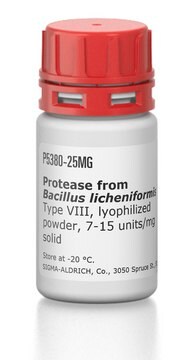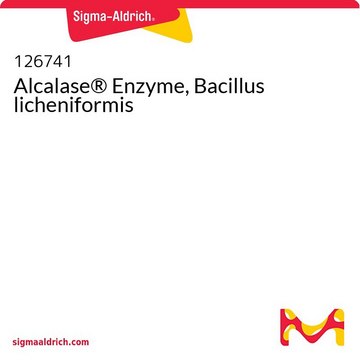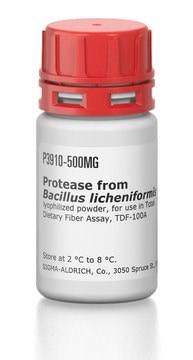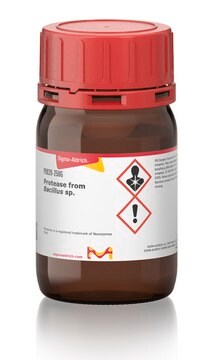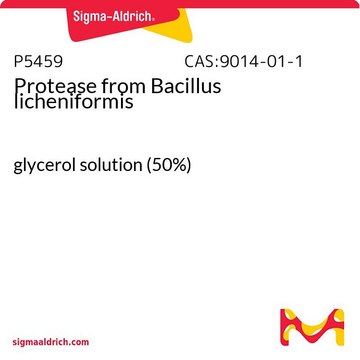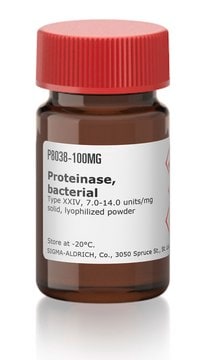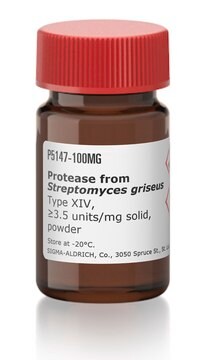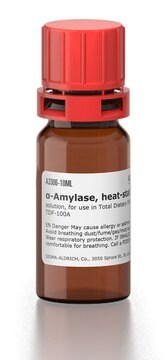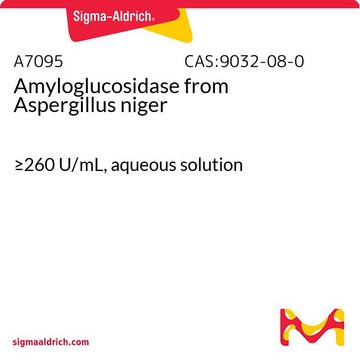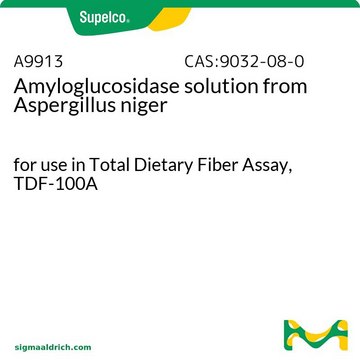P4860
Protease from Bacillus licheniformis
≥2.4 U/g
Synonym(s):
Alcalase® 2.4L, Proteinase from Bacillus licheniformis, Subtilisin A
Sign Into View Organizational & Contract Pricing
All Photos(1)
About This Item
Recommended Products
Looking for similar products? Visit Product Comparison Guide
Related Categories
General description
Proteolytic enzymes are known to possess catalytic, non-catalytic and ancillary domains. Proteases are broadly classified as endopeptidases and exopeptidases. Functionally they are divided as aspartic, glutamic, cysteine, threonine, serine and metalloproteases.
Application
Protease is an enzyme used to break down proteins by hydrolyzing peptide bonds. Protease is used to degrade proteins, to study protease inhibitors and to study thermal inactivation kinetics. Protease is used in nucleic acid isolation procedures in incubations.
The enzyme from Sigma has been used to prepare chicken (leg) bone protein hydrolysates while evaluating ACE inhibitory peptides. It has also been used for the hydrolysis of Chlorella pyrenoidosa protein extracts during a study of their antitumor activities.
Biochem/physiol Actions
Alcalase is an endo-protease of the serine type. It has a broad substrate specificity and can hydrolyze most peptide bonds within a protein molecule. It is active between pH 6.5 and 8.5 and has an optimum temperature of 60 °C. The enzyme is is used in detergent formulations to remove protein-based stains.
Protease catabolizes proteins by hydrolysis of peptide bonds. Proteases are inactivated by serine active-site inhibitors, such as phenylmethylsulfonyl fluoride (PMSF) and diisopropylfluorophosphate .
Analysis Note
Activity expressed in Anson Units
Legal Information
A product of Novozyme Corp.
Alcalase is a registered trademark of Novozymes Corp.
Signal Word
Danger
Hazard Statements
Precautionary Statements
Hazard Classifications
Aquatic Acute 1 - Aquatic Chronic 2 - Eye Dam. 1 - Resp. Sens. 1 - Skin Irrit. 2 - STOT SE 3
Target Organs
Respiratory system
Storage Class Code
10 - Combustible liquids
WGK
WGK 2
Personal Protective Equipment
dust mask type N95 (US), Eyeshields, Gloves
Choose from one of the most recent versions:
Already Own This Product?
Find documentation for the products that you have recently purchased in the Document Library.
Customers Also Viewed
Catherine Cesa-Luna et al.
PloS one, 15(10), e0240545-e0240545 (2020-10-16)
The bacterial strain, EMM-1, was isolated from the rhizosphere of red maize ("Rojo Criollo") and identified as Pseudomonas protegens EMM-1 based on phylogenetic analysis of 16S rDNA, rpoB, rpoD, and gyrB gene sequences. We uncovered genes involved in the production
Fu-Yuan Cheng et al.
Animal science journal = Nihon chikusan Gakkaiho, 80(1), 91-97 (2010-02-19)
This study aims to identify peptides with angiotensin-I converting enzyme (ACE) inhibitory activity in hydrolysate from chicken leg bone protein hydrolyzed with alcalase for 4 h (A4H). The hydrolysate has demonstrated potent in vitro ACE inhibitory activity, and has been
Xiaoqin Wang et al.
Biotechnology progress, 29(3), 681-687 (2013-04-23)
Chlorella pyrenoidosa is a unicellular green algae and has been a popular foodstuff worldwide. However, no reports on the antitumor peptides from such a microalgae are available in the literature. In this study, using low-temperature high-pressure extraction, enzymatic hydrolysis, ion
Proteases: multifunctional enzymes in life and disease
Lopez-Otin C and Bond JS
Test, 283(45), 30433-30437 (2008)
Keiichi Yokoyama et al.
Applied microbiology and biotechnology, 87(6), 2087-2096 (2010-06-04)
Microbial transglutaminase (MTG) has been used extensively in academic research and the food industries through its cross-linking or posttranslational modification of proteins. Two enzyme engineering approaches were applied to improve MTG activity. One is a novel method of rational mutagenesis
Our team of scientists has experience in all areas of research including Life Science, Material Science, Chemical Synthesis, Chromatography, Analytical and many others.
Contact Technical Service